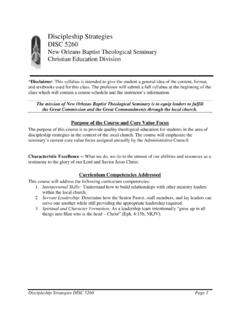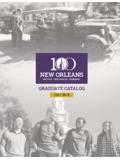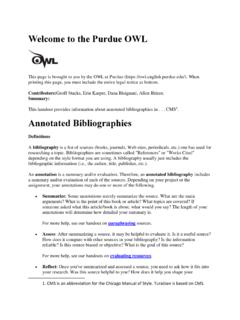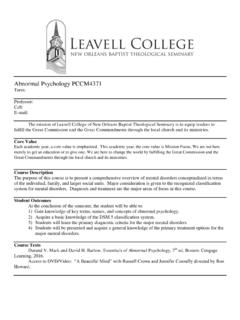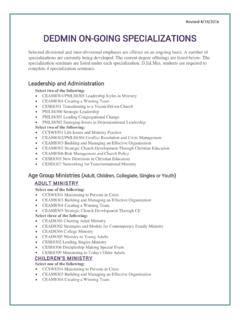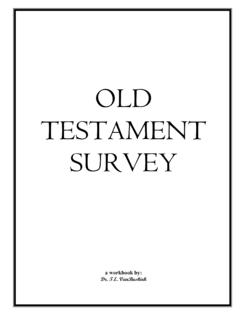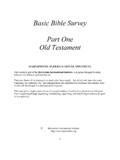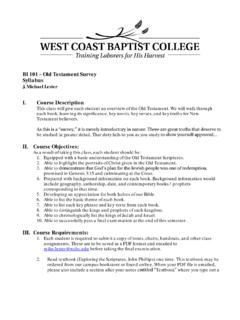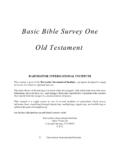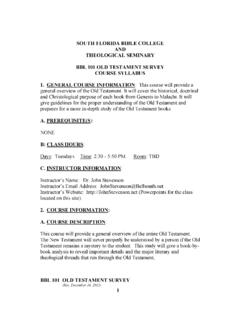Transcription of BSCM2310 OLD TESTAMENT SURVEY New Orleans …
1 BSCM2310 OLD TESTAMENT SURVEY New Orleans Baptist Theological Seminary Disclaimer: This syllabus is intended to give the student a general idea of the content, format, and textbooks used for this class. The professor will submit a full syllabus at the beginning of the class which will contain a course schedule and the instructor s information. Course Description The purpose of Old TESTAMENT SURVEY is to prepare the student for more intensive studies in the Old TESTAMENT . Emphasis is placed upon gaining an overview of the Old TESTAMENT through a SURVEY of geographical and historical backgrounds and a book by book study. Attention is given to the structure of each biblical book, significant interpretative problems, and major theological themes. This course is a prerequisite to all Old TESTAMENT Interpretation courses.
2 Course Objectives This course will emphasize the ministerial competency of Biblical Exposition. It will also strengthen the Life Skills of reading and computer skills. In order to interpret and communicate the Bible accurately, the students , by the end of the course, should: 1. Comprehend the introductory issues of the Old TESTAMENT . 2. Value the Old TESTAMENT as the revelation of God to people. 3. Read the Old TESTAMENT more critically through an appropriate understanding of introductory mattersand the central themes. Course Textbooks The Bible. (NASB, NASB 1995 Update, KJV, NKJV, RSV, NRSV, ESV, NIV, HCSB, or NLT) Hill, Andrew E. and John H. Walton. A SURVEY of the Old TESTAMENT . 3d ed. Grand Rapids: Zondervan, 2009. (Hereafter referred to as H&W3) Smith, Marsha A.
3 Ellis, ed. Holman Book of Biblical Charts, Maps, and Reconstructions. Nashville: Broadman and Holman Publishers, 1993. Course Methodology The principal means of instruction will be through Blackboard: including Discussion Boards, audiovisual presentations, and individual student assignments. Individual reading assignments in the Bible and the textbooks will provide an integral part of the learning environment. Course Requirements 1. CLASS PARTICIPATION. a. Your participation will be an important element in your success (what you learn and what grade you earn) of Old TESTAMENT SURVEY this semester. i. A significant portion of the course grade will come from your participation. ii. So be prepared to spend the time necessary to complete the required assignments.
4 B. The class participation grade will include the following assignments: i. WEBLIOGRAPHY. (1) Each student will locate one website specifically related to the study of the Old TESTAMENT . (a) The site may be written from a Christian or Jewish perspective. (b) The student will write a 3-paragraph summary and critical evaluation of the website from a content perspective and the aesthetics of the site (is it easy to navigate? Could you find what you were looking for? etc.). (i) The summary should list the web address. (ii) It should also list the main points of the website. (iii) The evaluation should evaluate the qualifications of the author. (iv) The evaluation should also include a critical evaluation of the site itself, not merely a summary of the contents, , author s purpose, did he/she accomplish that purpose, strengths and weaknesses of the website, etc.
5 (v) The Webliography critical evaluation by each student must be submitted to the Discussion Board between March 28 and April 10, 2011 (by 11 pm eastern time, 10 pm central time). (2) Each student will also critique one classmate s website, using the same guidelines as above. You must choose one site that has not been evaluated by a second student (only two evaluations per website). (a) The critique of another student's website evaluation must be submitted between April 11 and April 17, 2011 (by 11 pm eastern time,10 pm central time). (b) The original critique of the website should be posted as a new thread under the Webliography heading on the Content Discussion Board. (c) The critique by a second student should be posted under this new thread. Thus, each threaded discussion will deal with one website.
6 (3) Each student will also (a) Skim all of the posted websites and (b) Read all of the critical evaluations of each website. (4) When the webliography is complete, we will have one website per student and two critical evaluations for each website. ii. DISCUSSION BOARDS. We will use several discussion boards for this class. (1) NOTE: there are no dumb questions. Please ask what s on your mind. You are probably not the only one who s wondering. I also need to know if my instructions/comments are not as clear as I think they are. (2) PRAYER REQUESTS. (a) This discussion board is not a course requirement. (b) It is available for us to share prayer requests and commit to praying for each other and our families, and any other prayer requests. (3) ASK THE PROFESSOR.
7 (a) Any question or request that you have related to the course should be posted on this discussion board, not sent by individual email. (b) I will answer the questions/requests on this discussion board so that all students will be able to see the response. (c) We should treat this board and these questions as if we are in class; the questions and answers are for the benefit of all of the students . (d) Of course, if you have any private or personal questions/requests, use my email address to contact me and I will respond only to you. (4) ASK OTHER students . (a) This board is for technical questions/answers related to Blackboard or other technical issues for this online course. (b) If you have a technical question, perhaps another student has the answer.
8 (c) If you need to ask our ITC people a question, the email address is . (d) Also, if any student has discovered useful technical info for the entire class, this board is the place to post that information. (5) CONTENT DISCUSSION BOARD. (a) I will use this discussion board to post Old TESTAMENT content questions related to the OT materials we are studying. (b) I may choose to transfer some of the Ask the Professor questions to this discussion board for the benefit of the entire class. (c) I will post a certain number of questions that are specifically related to the unit we re studying. (i) Your assignment is to check the board at least 3 times each week. (ii) You will need to respond to the questions/comments when you have an appropriate response.
9 1) For example, I am not expecting you to post yes, I agree with Susie s comment. 2) If you have a response (or a related question/thought) that contributes to the discussion, I want you to post your response. (iii) Since you have time to process the question and think about your answer(s), I do require a minimum of one substantive response from each student to each discussion question. (d) Please read the Discussion Board guidelines posted in the Assignments section on Blackboard for further information on expectations, grading, etc. 2. READING ASSIGNMENTS. students are required to read according to the class schedule below: a. The entire Old TESTAMENT b. The assigned chapters in H&W3 c. The additional assigned readings d. To receive full credit, the assigned readings must be completed NO LATER THAN the assigned date on the schedule.
10 Any reading that you do after --- will count for the required readings. e. As they complete the daily reading assignments, students should complete the Reading Log attached to this syllabus. f. The Reading Log must be submitted via the Assignments section on ---, by 11 pm eastern time (10 pm central time). Reading Logs submitted after this date/time will be penalized 5 points per day. 3. CLASS NOTES. a. The class lecture notes are posted on Blackboard (in Course Documents). b. students should download the notes and use them, along with the textbook, to create the Critical Introductions for each biblical book. 4. CRITICAL INTRODUCTION FOR EACH BIBLICAL BOOK. a. Each student will electronically submit (using the Assignments section) a Critical Introduction for each of the 35 books in the OT i.


